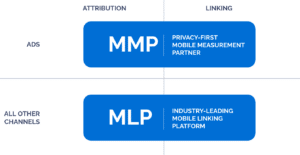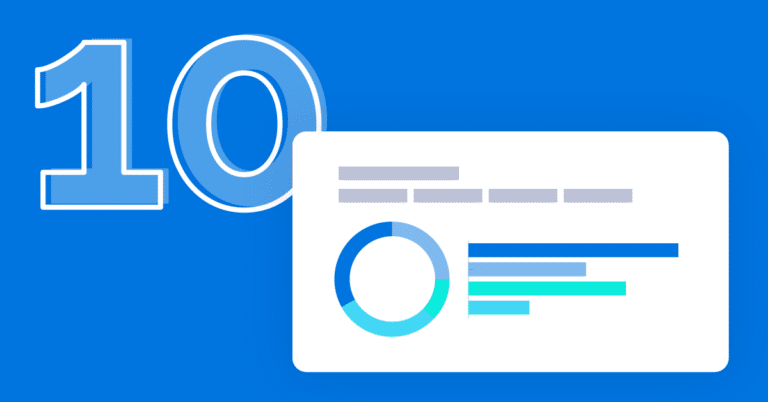Why You Need an MMP and Why Branch Is the Best Fit

MOBILE MEASUREMENT PARTNER
Maximizing the value of your ad campaigns
In the rapidly evolving landscape of mobile applications, brands face the increasing challenge of understanding user behavior and optimizing marketing performance. To success fully navigate this dynamic environment, marketing teams rely on the invaluable insights provided by mobile measurement partners (MMPs).
An MMP is a sophisticated analytics tool designed to track, analyze, and interpret user interactions within mobile applications. This enables stakeholders to make data-driven decisions while empowering marketers and app developers to enhance their app’s user experience.

One of the most fundamental features of an MMP is its ability to accurately attribute app installations and conversion events from ad campaigns back to their sources. MMPs that utilize advanced mobile attribution models allow marketers to identify the marketing channels, campaigns, and even specific ads that drive users to download and engage with their app. This information is crucial for marketers who are optimizing their advertising strategies, allocating marketing budgets efficiently, and understanding the return on ad spend (ROAS) from various marketing efforts.
Apart from acquisition metrics, MMPs provide valuable app analytics and insights into in-app user behavior and engagement. From there, marketers can gain a deeper understanding of how their users interact with their app’s features, identify points of friction or drop-offs in the user journey, and optimize the user experience accordingly. By analyzing user behavior, businesses can personalize content, send targeted notifications, and even create more engaging experiences to retain app users and encourage loyalty.
Reporting-wise, MMPs usually offer cohort analysis, funnel analysis, cost aggregation, and retention analysis, among other advanced features. These analytical tools help identify long-term trends, calculate user churn rates, and paint a more detailed picture of the overall app userbase. Armed with this information, marketers can continuously iterate on their app and make data-driven improvements to achieve higher user satisfaction and retention rates.
Privacy and data security are paramount in the mobile app ecosystem. Reputable MMPs follow strict privacy guidelines and ensure that all collected data is anonymized and aggregated to protect users’ identities and sensitive information. Adhering to regulations such as the General Data Protection Regulation (GDPR) and the California Consumer Privacy Act (CCPA) builds trust among users and protects businesses from potential legal repercussions. The best MMPs stay at the cutting edge of these changes and help brands navigate these waters smoothly.
At its core, an MMP is built to capture a comprehensive range of data points from mobile applications. This includes app installations, app opens, in-app behavior, session lengths, user retention, and user acquisition sources. The app data is collected using sophisticated tracking mechanisms like software development kits (SDKs) integrated into the mobile app.
The data MMPs collect is then aggregated, analyzed, securely transmitted to the platform’s backend, and presented in user-friendly dashboards as a single source of truth. This data provides advertisers, marketers, and app developers with valuable insights into user engagement and conversion rates, alongside the overall impact of their marketing campaigns.
The key advantages of MMPs range from accurate mobile attribution to ad fraud prevention, all of which contribute to a more strategic and successful mobile marketing landscape.
Let’s explore how MMPs shape the way advertisers understand, strategize, and excel in the dynamic world of mobile advertising.
The integration process typically starts with connecting the MMP’s SDK into the advertiser’s mobile app or website. The MMP’s SDK should enable you to track user interactions, events, and conversions. From there, you can set up attribution rules to define how credit for conversions is assigned to various touchpoints in the user journey. This involves determining attribution windows, last-click attribution, multi-touch attribution, and more. You’ll also need to configure the tracking of specific in-app events, such as signups, purchases, or other conversions. Once correctly configured, these events provide detailed insights into user engagement and conversion rates.
MMPs use deep linking to ensure that users are directed to specific in-app pages related to the ad they clicked. Utilizing the data provided in the MMP’s dashboard, advertisers can continuously optimize campaigns by targeting parameters, experimenting with creative elements, and altering bidding strategies based on performance metrics.
MMPs are a crucial component of the modern mobile app marketing technology stack and should seamlessly integrate with various other tools and platforms to streamline the marketing process. Here’s how MMPs fit into the bigger mobile app marketing picture.
Ad platforms
MMPs integrate with ad networks and platforms, allowing advertisers to track campaign performance across different channels — be it social media, search, or display advertising.
Analytics tools
The data collected by MMPs can be shared with analytics platforms, enabling a comprehensive view of user behavior and engagement. Your MMP integration should support robust reporting and in-depth analysis.
CRM systems
Integrating your MMP data with your customer relationship management (CRM) systems enhances user profiling and segmentation, leading to more personalized and targeted marketing efforts.
Attribution models
MMPs that align with attribution modeling tools help you evaluate the most effective touchpoints within your users’ journeys and allocate budget accordingly.
Marketing automation
Certain MMPs can trigger marketing automation sequence actions based on user interactions. This enhances the overall user experience and potentially drives conversions.
Selecting the right MMP is a critical decision that can significantly impact the success of mobile advertising campaigns. Here are some essential considerations when making this choice.
Your mobile measurement partner plays a pivotal role in the mobile app ecosystem by providing a wealth of data-driven insights to businesses and app developers. By analyzing your users’ interactions, attribution data, and engagement metrics with a reliable MMP, you can optimize your apps, enhance user experiences, drive user acquisition, and ultimately achieve your business goals. As mobile technology continues to advance, mobile measurement partners will remain an indispensable tool in the pursuit of app success and customer satisfaction.


